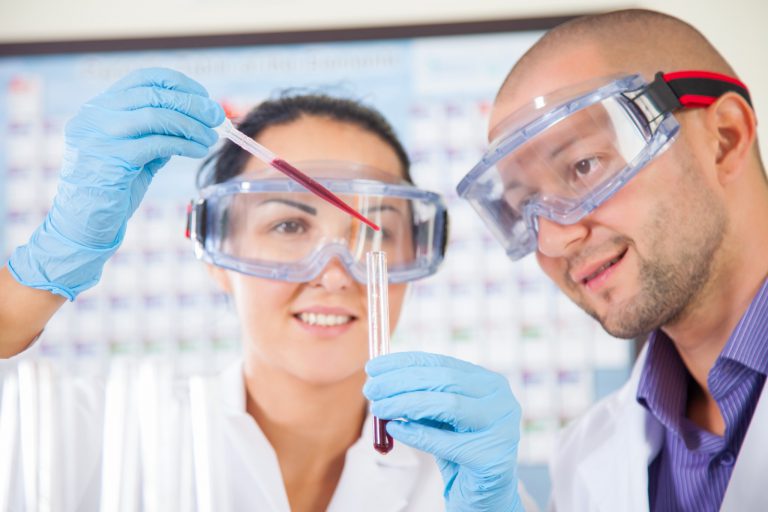
Life Sciences are the sciences dedicated to studying living processes and organisms, such as biochemistry, botany, zoology, and genetics, and such spheres of scientific study are crucial in understanding how we, and the life around us, function and grow.
The Life Sciences industry, worth over 200 billion dollars in market value is steadily evolving, with the global health care distribution market expected to grow 6.82% a year. Future specialists in Life Sciences can benefit from entering a developing industry with increasing job opportunities, but it is crucial to understand why this growth is happening in order to identify good fields of study to explore in future careers.
One of the biggest catalysts of growth in Life Science industries is new technologies and resources, as technology and science are more interlinked than ever, with 84.3% of life sciences companies expecting rapid increase in the development of technology in the next three years, according to Accenture.com, a recognised supplier of technology for emerging Life Science companies.
As newer technological resources such as lab data analysis software are becoming essential tools in life sciences, prospective students in Life Science fields would be wise to choose qualifications that offer current industry-based learning and resources. In fact, industry-based education is considered ‘the goal for scientists in training who want to work in the life sciences industry’ says Clifford Mintz, of Science Magazine.
![]()
Image courtesy of the University of Skövde
Another source of growth in Life Science are the scientific specimens themselves, as new discoveries result in new fields of study and education. People in particular are a promoter of research in the industry, as according to the Deloitte 2016 Global Life Sciences Outlook, ‘aging populations, the growing prevalence of chronic diseases, rising consumer wealth, and other changing demographics are expected to boost health care spending and the demand for life sciences products in 2016 and beyond.’ Growing interest in public health has meant the services and education behind the sciences have developed to meet the demand for excellence and immediacy in study, diagnosis, and treatment of diseases.
The professionals within Life Sciences also influence its growth, as they undertake quality education and training as specialised pioneers and irreplaceable assets to any Life Science company, in any capacity. Laurel Clark, NASA astronaut and medical doctorate in medicine and zoology once said ‘Life science research can be done on multiple platforms. Since we have a very small number of people flying into space, the more people you have, the better.’
Laurel Clark was one of seven astronauts that died aboard Space Shuttle Colombia explosion in 2003. Clark was a firm believer in the vast utility of life science qualifications that create opportunities for students all over the world, and beyond.
Here are five European institutions at the forefront of life-science education:
UNIVERSITY OF SKÖVDE, SCHOOL OF BIOSCIENCE – SWEDEN
The University of Skövde is recognised as one of the most specialised institutions in Europe, specifically for its Systems Biology Research Centre that explores studies in bioinformatics, infection biology, biotechnology, cognitive neuroscience, ecology and biomedical genetics, despite being one of the youngest universities in the region. Skövde takes pride in its Life Science education facilities, as it offers an array of master programmes that feature Bioinformatics, Cognitive Neuroscience, Infection Biology, Molecular Biotechnology, Tumor Biology, and the new jointly developed with Swedish Life Science enterprises in Biomarkers. Eighteen programmes are taught in English, and the University currently has two International Bachelors programmes in Biomedicine and Molecular Bioscience.
![]()
Image courtesy of the University of Skövde
Skövde’s School of Bioscience teaches around 1400 students a year throughout its 13 educational programmes, at both undergraduate and postgraduate levels. The School of Bioscience is remarkably specialised, as it is divided into three separate departments: The Division for Bioinformatics, Biomedicine and Ecology, The Division for Cognitive Neuroscience and Philosophy and The Division for Molecular Biology.
Life Science students at the University of Skövde are taught key scientific practices in lessons designed to encourage collaboration with communities within business and International organisations, which really keeps the ‘life’ focus of Life Sciences at the forefront of their education.
FACULTY OF HEALTH SCIENCE, UNIVERSITY OF SOUTHERN DENMARK – DENMARK
Established in 1966, the University of Southern Denmark is a solid choice for Life Science education, as the Faculty of Health Science specialises in ‘public health and on the development of the health service’, alongside sports science, developing pharmaceuticals, Patient Care Research, and Health Education.
The faculty offers 8 bachelor programmes and 10 Masters programmes, covering a wide range of fields including Medicine, Clinical Biomechanics, Sport and Health, Biomedicine, Logopaedics, and Audiology.
The faculty also offers three Health Science courses to Exchange students, an example of the faculty’s strong international viewpoint on teaching and research.
The university of Southern Denmark is well-regarded for its academic and research performance, but the Faculty of Heath Science uses research to improve both the education experience and the Health Sciences themselves, making breakthroughs in Virtual Reality training tools and Child Health Education that will help shape the future of Life Science education.
![]()
Image courtesy of the University of Southern Denmark
FACULTY OF HEALTH, MEDICINE, & LIFE SCIENCES- MAASTRICHT UNIVERSITY (UM) – NETHERLANDS
The youngest and most international university in the Netherlands, Maastricht University (UM) is an institution that recognises the global reach and demand for Life Science education.
The Faculty of Health, Medicine and Life Sciences (FHML) offers four specialisations in Bachelor’s degrees in Biology and Health, Mental Health Sciences, Policy, Management and Evaluation of Health Care, Prevention and Health. The Faculty runs courses at all levels of learning, including five Master’s courses, a PhD programme, and short course top-ups for practicing professionals.
With over 30% of its 4,500 students and 1,600 staff coming from abroad, UM is an institution that recognises International collaboration, and Students studying in the Faculty of HML can be assured of global industry-centric, Problem-Based Learning that will give them the necessary experience and skills for achieving the professional understanding of the Faculty’s ethos: ‘integration of patient care, research, education and public health’.
![]()
Image courtesy of Maastricht University
FACULTY OF HEALTH – UNIVERSITY OF EASTERN FINLAND
The University of Eastern Finland (UEF) is one of the largest universities in Finland, and has been consistently ranked high in the Top 100 World’s Top Young Universities. UEF’s Faculty of Health is a whirlwind of activity teaching 2,500 Bachelor’s and Master’s students a year, and is also heavily involved at a professional level in Life Sciences, with over 800 publications to date.
The Faculty boasts strong International research links in the fields of Cardiovascular and metabolic diseases, and Neurosciences, as well as translational Cancer Research.
With a professional global industry-based education strategy in mind, the University tailors its courses for interdisciplinary study, meaning students can maximise their professional credentials in the fields of health science.
COLLEGE OF SCIENCES AND HEALTH – DUBLIN INSISTITUTE OF TECHNOLOGY (DIT)
Dublin Institute of Technology (DIT) has been shaping Higher Education in Ireland for 125 years, with a characteristic approach to research-based education that features practice-based learning, internships, volunteering, and study-abroad projects.
DIT offers over 30 undergraduate courses in Life Sciences subjects such as Forensic and Environmental Chemistry, Bioscience, Dietics and Nutrition, Optometry, and Biomedical Science, with a rich array of full-time and part-time course options, also at postgraduate level.
Science students at DIT have access to a multitude of research materials and resources via work internships, and through the Graduate Research School, which helps students refine their study and critical research abilities to world-class industry standards.
*Some of the institutions featured in this article are commercial partners of Study International
Feature image via Shutterstock
Liked this? Then you’ll love these…
The future of health sciences: 4 innovative health science faculties
Physics and the female brain: How science can change the way you think











